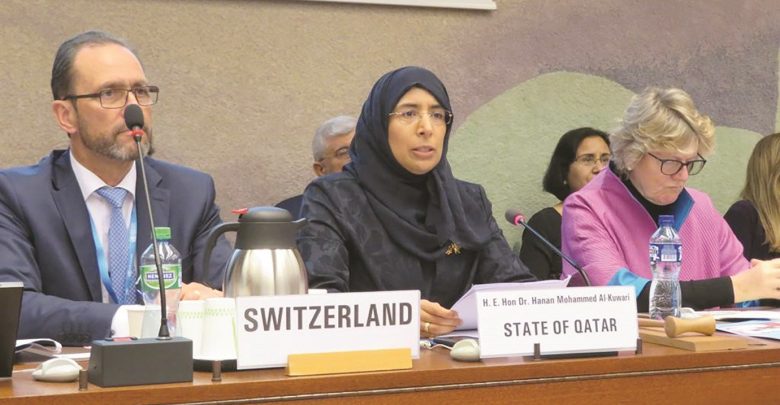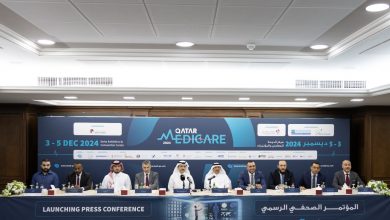
Qatar calls for global plan of action on patient safety
دعوة من أجل تنفيذ خطة عمل عالمية بشأن سلامة المرضى
QNA/Geneva
Access to safe and high quality healthcare is a human right in accordance with international humanitarian law, HE the Minister of Public Health, Dr Hanan Mohamed al-Kuwari, said launching the symposium here on healthcare quality and patient safety in the face of emergencies and adversities as a prerequisite for achieving universal health coverage.
Some 17 countries, WHO Secretariat, WHO Regional Office for the Eastern Mediterranean and a number of non-governmental organisations are participating in the symposium, which was held on the sidelines of the WHO World Health Assembly.
Addressing the symposium, the minister added that securing this right worldwide requires regional and international co-operation and overcoming obstacles that face the path to safer healthcare and the pledge to leave no one behind, calls for safe comprehensive health coverage and making patient safety and care quality top priority.
HE al-Kuwari presented the efforts made in the patients’ safety field since the Alma Ata Declaration more than 40 years ago.
She added that the WHO and the Global Ministerial Summits on Patient Safety had launched an agenda for safer care in low-and middle-income countries, and recently in areas of extreme adversity.
HE the minister of public health said the healthcare system in Qatar is of high quality and safety and that the modern and internationally accredited hospitals as well as Hamad Medical Corporation (HMC) healthcare workers work with local and international partners to ensure that patients are provided with quality care and safety.
She highlighted the humanitarian activities and commitments that Qatar is known for. Relevant stakeholders in Qatar are working to improve the lives of those in need globally through a wide range of humanitarian assistance, relief services and development activities, where the 2018 World Summit on Innovation in Health Care (WISH) issued a report on challenges and opportunities for achieving universal health coverage in conflict areas, she added.
HE al-Kuwari said part of its commitment to global health security, Qatar was one of the first countries in the Eastern Mediterranean region and the seventh in the world to be subject to the external assessment process to measure compliance with the International Health Regulations 2005, to ensure that Qatar is ready to respond to any problems related to global health security.
HE al-Kuwari, said despite international priorities and country-specific commitments being identified, there is a gap in patient safety and this gap is more prominent in emergencies and tribulations and meeting this challenge has several complex aspects and requires intersectoral and global co-operation between countries and organisations.
The WHO Regional Office for the Eastern Mediterranean is working on a promising study with a number of partners to review key challenges and priorities for quality and safety in times of adversity with a goal to formulate a framework or road map to help implement a flexible healthcare system capable of responding effectively to any challenges, she said.
HE al-Kuwari called on all political leaders and policy makers from around the world to work towards a common vision for the development and implementation of a global plan of action on patient safety, stressing that safety must be a prerequisite for achieving comprehensive health coverage during emergencies and adversities, while strengthening the approach to serving those in need.
She said that health and well-being are the core of peace and conflict resolution and that the shared vision of building a comprehensive and safe healthcare system that supports communities and prevents adversity is now essential.
In the conclusion of the symposium, HE al-Kuwari called for intensified global efforts in treating patients who are living in rough environments.
She called for a global implementation of patient safety, and learning from the experience of WHO in that regard.
She noted that Qatar, as part of its efforts of implementing the resolutions of the Global Action on Patient Safety, will contribute to building capabilities for that purpose and hosting consultations and technical meetings to discuss the matter. The minister also called on international organisations and states to think about their commitments and the procedures that they can carry out.
According to a World Health Organisation (WHO) report on universal health coverage, at least half of the world’s population still lack access to basic health services, resulting in between 5.7mn and 8.4mn deaths per year in low- and middle-income countries. The situation is even worse in fragile countries that are struck by armed conflicts, plagues or natural disasters. Healthcare systems in those countries according to the report are terribly affected by the increased demand and reduced resources.
Numbers show that around 350mn children currently live in conflict zones of some type. Additionally, 20 people are forcibly displaced every minute as a result of conflict or persecution, leading to a total of 65.6mn people, including some 22.5mn refugees, according to the UN High Commissioner for Refugees (UNHCR).
The symposium was organised to reflect the commitment of Qatar to its responsibility towards international community and humanity, and its commitment to enhancing regional and international partnerships in the healthcare field.
نظّمت دولة قطر ندوة «جودة الرعاية الصحية وسلامة المرضى في مواجهة حالات الطوارئ والمحن كشرط أساسي لتحقيق التغطية الصحية الشاملة»، على هامش اجتماعات جمعية الصحة العالمية في جنيف، بمشاركة نحو 17 دولة، وأمانة منظمة الصحة العالمية، والمكتب الإقليمي لمنظمة الصحة العالمية لشرق المتوسط، وعدد من المنظمات غير الحكومية.
افتتحت الندوة سعادة الدكتورة حنان محمد الكواري وزيرة الصحة العامة، مؤكدة أن الحصول على رعاية صحية آمنة وذات جودة عالية يُعدّ حقاً من حقوق الإنسان وفقاً للقانون الإنساني الدولي، ويتطلب تأمين هذا الحق على مستوى العالم تعاوناً إقليمياً ودولياً.
وقالت سعادتها: «إن نظام الرعاية الصحية في قطر يتمتع بالجودة والسلامة العالية، وتعمل مستشفياتنا الحديثة والمعتمدة دولياً وكذلك العاملون في مجال الرعاية الصحية لدى مؤسسة حمد الطبية مع الشركاء المحليين والدوليين لضمان تزويد مرضانا برعاية حانية ذات جودة وسلامة عالية».
وأشارت سعادتها إلى الأنشطة والالتزامات الإنسانية التي تُعرف بها دولة قطر. موضحة أن الجهات المعنية ذات الصلة في دولة قطر تعمل على تحسين حياة المستضعفين على الصعيد العالمي، من خلال مجموعة واسعة من المساعدات الإنسانية وخدمات الإغاثة والأنشطة التنموية.
وأضافت سعادتها: «وجزءاً من التزامنا بالأمن الصحي العالمي، فقد كانت قطر من أوائل الدول بمنطقة شرق المتوسط والسابعة عالمياً التي تخضع لعملية التقييم الخارجي لقياس مدى الالتزام باللوائح الصحية الدولية لعام 2005؛ للتأكد من جاهزية دولة قطر للاستجابة لأي مشكلات متعلقة بالأمن الصحي العالمي».
وقالت سعادة الدكتورة حنان محمد الكواري: «على الرغم من تحديد الأولويات الدولية والتزامات كل دولة على حدة، نعتقد أن هناك فجوة في تحقيق سلامة المرضى، وتكون هذه الفجوة أكثر بروزاً في حالات الطوارئ والمحن». مضيفة: «إن مواجهة هذا التحدي لها عدة أوجه معقّدة، وتتطلب تعاوناً بين القطاعات إقليمياً وعالمياً وبين البلدان والمنظمات».
وأشارت إلى أن مكتب شرق المتوسط بمنظمة الصحة العالمية يعمل على دراسة واعدة مع عدد من الشركاء؛ لمراجعة التحديات والأولويات الرئيسية للجودة والسلامة في وقت المحن، بهدف صياغة إطار أو خارطة طريق تساعد على تطبيق نظام رعاية صحية مرن قادر على الاستجابة بكفاءة وفعالية لأي تحديات.
ودعت سعادتها جميع القادة السياسيين وصانعي السياسات من شتى أنحاء العالم إلى العمل من أجل رؤية مشتركة لتطوير وتنفيذ خطة عمل عالمية بشأن سلامة المرضى. مؤكدة على ضرورة أن تكون السلامة شرطاً أساسياً لتحقيق التغطية الصحية الشاملة أثناء حالات الطوارئ والمحن وتعزيز نهجنا تجاه «خدمة المستضعفين».



